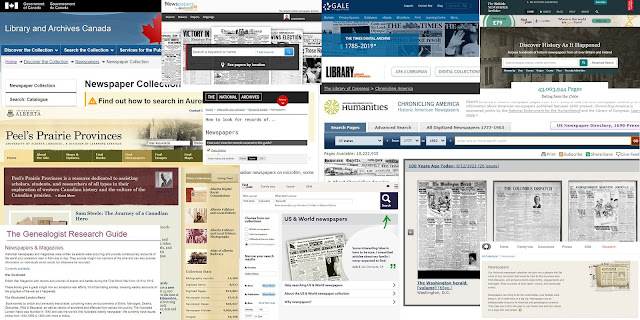I use newspapers a lot for both family history research and as sources for articles I write. They are great for tracking down people and learning about particular events as they were reported at the time they occurred. Many websites have digitized pages so you can see the actual accounts. Indexing means you can search for keywords and dates.
I have subscriptions at Newspapers.com
through Ancestry (https://www.newspapers.com/) and The
British Newspaper Archive (https://www.britishnewspaperarchive.co.uk/) Along with my database subscriptions at FindMyPast, TheGenealogist
and MyHeritage come more newspapers (or perhaps many of the same). Most
of the papers go back to the 18th century. They do not all have the
same newspapers but between all the sources, the world is covered very well.
I have used individual newspaper archives as not all the major or local news publications are part of the subscription-based websites. Subscriptions are required by some. The Times (London) can be sourced through a subscription at the Gale website. (https://www.gale.com/intl/c/the-times-digital-archive)
Many papers can be viewed through public library facilities or websites.
My local library card gets me to a few of those. Often contacting a library in
the area where you are looking for information will get a willing staff member
to look up news items for you. Be sure to thank them!
The University of Alberta sponsors a website called Peel’s Prairie
Provinces which has a large inventory of local and regional newspapers and
directories online that go back to 1871. (http://peel.library.ualberta.ca/aboutsite.html) Their collections include many
local publications from towns and cities across the province. I am sure other
regions have similar collections. The archives of our local
paper, the Calgary Herald are available through the University of
Calgary website. (https://calgarylibrary.ca/read-learn-and-explore/digital-library/calgary-herald-archive-online/)
Most individual newspapers have their own archives, some of which are
searchable for free. National archives also are great repositories for
historical publications including newspapers. In the United States there is the
Chronicling America webpages of the Library of Congress. (https://chroniclingamerica.loc.gov/) In Canada many newspapers have been collected,
digitized and are searchable at the Library and Archives Canada website.
(https://www.bac-lac.gc.ca/eng/discover/newspapers/newspaper-collection/Pages/newspapers-collection.aspx) In the United Kingdom there is The
National Archives website. (https://www.nationalarchives.gov.uk/help-with-your-research/research-guides/newspapers/)
If you cannot access subscription sites directly you may be able to at
your local library or Family History Centre. If you have a library card, it may
allow you to sign into certain websites from home.
Just in the past few months, I have looked at and downloaded news items about a 1906 accidental death in Toronto, Ontario; a series of volcanic eruptions in Iceland in 1783-84; a 1984 obituary for a family member; another one from 1909; a tidal wave that hit southern Newfoundland in 1929; a 1917 report about an ancestor who was a WWI casualty; a wedding of a cousin in Saskatchewan in 1890; an epidemic in 1878; deadly winter weather in Europe in 1740; and a myriad of other bits and pieces about people, places and events.
Almost no matter what information you are seeking, you may find
references in newspapers going back several hundred years. You even find, as
many family historians can attest, data about that elusive ancestor that normal
data sources do not have – possibly a picture of them. Give it a try.


I use newspapers all the time for my research and have learned a ton about certain ancestors as a result (I have blogged about quite a few of these finds). In BC, library users can access The Times from Gale via https://pointstothepast.ca/index.html and local newspapers via the BC Historical Newspapers (hosted by UBC). As the majority of my research is in England, I use FMP's collection...
ReplyDelete